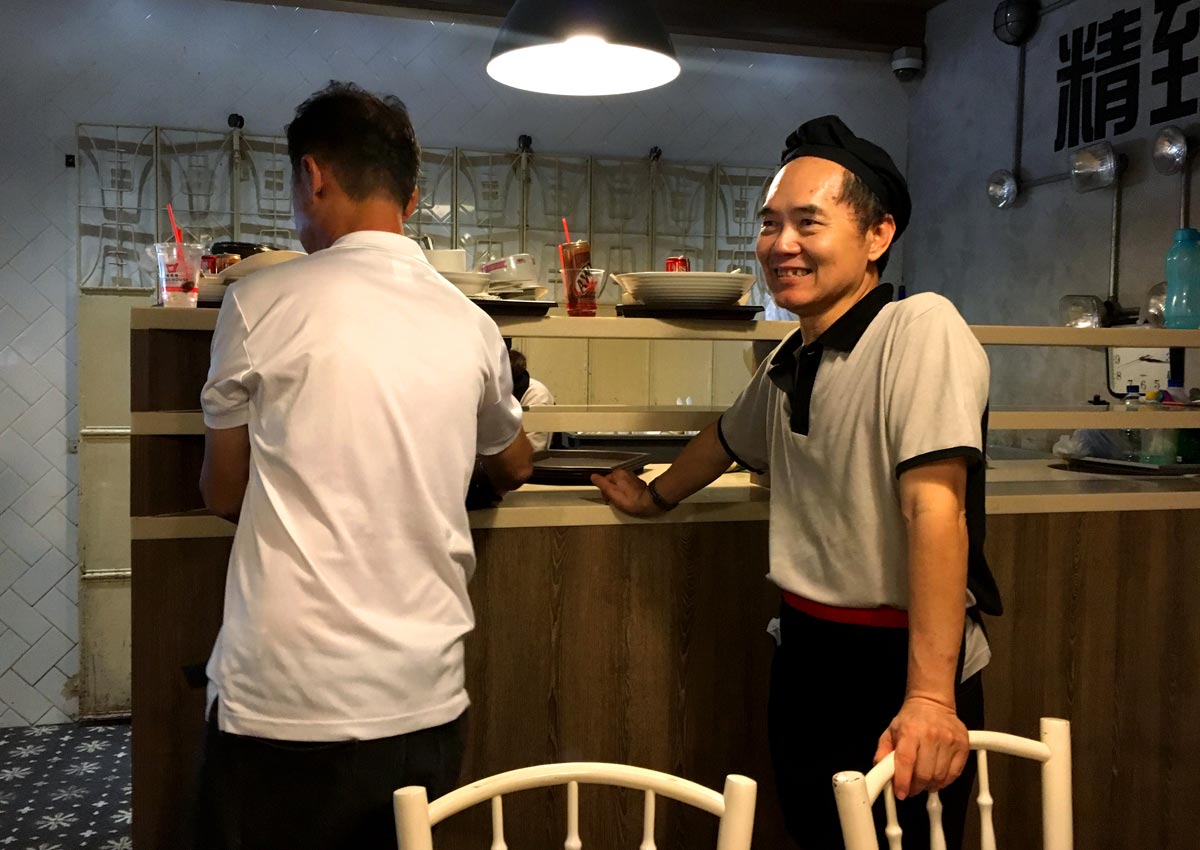On most days, Mr Png Lye Heng goes about his daily task without anyone taking notice, clearing tables at the food court at Jem shopping mall.
But last Friday, the cleaner, who is deaf, suddenly found himself in the spotlight after news of him being verbally abused by a patron at the food court went viral online.
The patron was Ms Alice Fong, a 37-year-old executive who was at the food court with her husband, and Mr Png became a victim of her tongue-lashing after he accidentally cleared her tray at her table despite her not wanting it cleared.
But days after the incident, the 64-year-old just wants to avoid the media glare, keep a low profile and move on, especially since Ms Fong has apologised, even though she insisted it wasn’t entirely her fault, saying she was sick, and Mr Png had no tag to say he was disabled.
Initially reticent about the brouhaha for fear of more conflict, Mr Png finally relented and told The New Paper: “I’m fine with (the incident). I’ve let it go already.”
Then he broke into a toothy grin.
Through a deaf student versed in sign language, TNP communicated with Mr Png yesterday while he went about clearing bowls and plates. Mr Png, affectionately known as “Ah Heng” to colleagues, said he has been working as a part-time cleaner at the Jem food court for about a year.
Every day, except on Saturdays, he works from morning till 5pm. Then he goes home.
The bachelor lives with his sister and mother.
Misunderstandings like the one he had with Ms Fong last Friday are not new, he conceded.
But he declined to elaborate, shaking his head and waving his hand in between gesturing to TNP that he prefers to keep mum about the misunderstandings.
Mr Png works in an environment where not everyone understands his disability.
RAISED VOICE
As TNP followed him to the back of the food court where dishes are washed, a fellow worker raised his voice at Mr Png, who was blocking the way in the cramped corridor.
He could not hear his colleague and did not budge.
Given the invisibility of disabilities like deafness, some, like Ms Fong, have argued that workers like Mr Png should wear a tag that indicates their disability.
But those who work closely with the disabled pointed out that the tag may become a label that leads to stigma.
Mr Png himself refused to wear a tag that indicates his deafness, said his manager who wanted to be known only as Steven, 51.
The cleaner does not seem to let his disability get in the way of his job.
He walks with a limp, but his gait does not stop him from walking from table to table, clearing bowls and plates in sight.
He may not be able to speak or hear, but he continues to exchange a smile or banter with some of the stall holders, who smile back.
Steven said he was initially worried that Mr Png would be so affected by the incident that he would not return to work.
Patrons have recognised and gestured at the cleaner, he said.
But when Mr Png greeted Steven and proceeded to work on Sunday morning, the cleaning company manager heaved a sigh of relief.
“As long as he doesn’t feel hurt… I have no intention to replace him as I feel he’s still an innocent party.
“I feel that he’s a nice guy. He still does what he’s supposed to,” said the manager.
He added that while he has heard rumours of Mr Png wanting to quit, the cleaner has never approached him about it.
“If he really wanted to resign, he could have told me. He’s a hardworking chap…
“I hope he will stay back and help me,” he said.
Focus on woman’s behaviour: Deaf hawker
When deaf hawker Peter Goh heard about the viral news of a woman hurling insults at a deaf cleaner at the food court at Jem shopping mall, he was curious and wanted to know why the man was scolded.
His son Joshua, a copywriter, told The New Paper: “He thought the focus should be on the woman’s ungracious behaviour, instead of the deaf cleaner.”
Mr Goh, who is in his 60s, has been selling carrot cake for the past 30 years.
He lost his hearing because of a childhood illness and runs a stall at Zion Riverside Food Centre.
When taking orders, he reads the lips of customers and relies on visual cues such as pictures of the food items. He has many regular customers, including those from the deaf community.
Mr Goh is against the idea of putting up a sign to indicate he is deaf.
“He doesn’t want special treatment or to be singled out because he is deaf. Besides, there are many newspaper articles about my dad at the stall, and people will realise that he is deaf after reading them,” said Mr Joshua Goh.
In response to the incident at Jem food court, the Singapore Association for the Deaf thanked the cleaner’s company for giving job opportunities to the deaf.
In a post on Facebook, it wrote: “There are many other well qualified deaf and hard-of-hearing persons working in various industries and contributing to society. More can be done to uplift the lives of (those with) special needs.”
In Singapore, there are several organisations, from social enterprises to major corporations such as KFC, which hire the deaf.
Dignity Kitchen has four deaf workers who sell coffee.
‘BEETHOVEN SCHEME’
Uber Singapore has the Beethoven scheme, which hires drivers who are deaf or hard of hearing.
An Uber spokesman estimates that it has “dozens” of these drivers in Singapore.
One such driver is Mr Roland Goh, 45, who is hard of hearing and has been driving with Uber full-time since February.
In his car, he has a note stating “Hi, I’m hearing impaired. If (you) need to communicate with me, feel free to use the paper provided. Have a nice trip.”
Mr Goh uses a notepad to communicate with his passengers.
Over SMS, he said that he has not met any nasty customers so far. He also faces the same challenges as any driver – locating the pick-up point of passengers.
He said: “Most of the customers are nice. I’ve received some of thank-you notes and kind words.”
‘Name tags stigmatise workers’
Dignity Kitchen founder Koh Seng Choon thought that customers would be more patient when his employees wore badges stating they were deaf.
To his shock, he noticed that some customers would shout orders at the deaf workers, or avoid them completely.
There are four deaf employees who have been selling coffee at Mr Koh’s food court in Serangoon Avenue 3 for the past four years.
Mr Koh said: “There were zero sales when they wore the badges. Some customers had the wrong interpretation that the workers would be able to hear if they spoke louder.”
Mr Koh’s social enterprise hires the disabled and disadvantaged, including the deaf, visually impaired and intellectually disabled.
He thinks that name tags labelling a worker’s disability can be a form of stigma.
“Some people don’t want to be branded (by their disability). They are competent workers but some customers might also be uncomfortable with buying from them.”
MORE EDUCATION
Mr Koh thinks that there should be more education to raise awareness of interacting with the disabled instead.
But Ms Lily Goh, who is deaf and co-founded ExtraOrdinary Horizons, a social enterprise that aims to promote arts and culture among the deaf, thinks that a name tag indicating that a person is deaf might be necessary in a work setting.
“Deafness is a hidden disability. We look like the mainstream society and that’s why we often get misunderstood.
“(Name tags) may reduce misunderstandings and our frustrations because sometimes people may ask us (questions) without knowing that we are deaf.”
But she draws the line against tags that indicate “deaf and mute” or “deaf and dumb”.
“These name tags are an insult to us and very derogatory. Some who are deaf do not speak but this does not mean they are mute or dumb.”
tnp@sph.com.sg

This article was first published on June 07, 2016.
Get The New Paper for more stories.





























